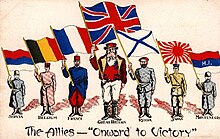Pembinaan bangsa
Pembinaan bangsa, bina bangsa, atau pembangunan bangsa adalah proses membina atau menyusun identitas kebangsaan menggunakan kekuatan negara.[1][2] Pembinaan bangsa bertujuan untuk menyatukan rakyat dalam negara sehingga tetap stabil secara politik dan berdaya maju dalam jangka panjang. Menurut Harris Mylonas, "Pewenang yang sah di negara-negara bangsa modern terhubung dengan kekuasaan rakyat dengan mayoritas. Pembinaan bangsa adalah proses yang melaluinya mayoritas ini dibangun."[3] Dalam kerangka kerja Harris Mylonas, "elite negara menggunakan tiga kebijakan pembinaan bangsa, yaitu akomodasi, asimilasi, dan penyisihan."[4]
Pembina bangsa atau pembangun bangsa adalah warga negara yang berprakarsa untuk membangun masyarakat nasional melalui program pemerintah, termasuk wajib militer dan sekolah massa muatan nasional.[5][6][7] Pembinaan bangsa dapat melibatkan penggunaan propaganda atau pengembangan prasarana utama untuk memupuk keselarasan sosial dan pertumbuhan ekonomi. Menurut sosiolog Universitas Columbia, Andreas Wimmer, tiga faktor cenderung menentukan keberhasilan pembinaan bangsa dalam jangka panjang, yaitu "perkembangan awal organisasi masyarakat sipil, munculnya negara yang mampu menyediakan barang umum secara merata di seluruh wilayah, dan munculnya media komunikasi bersama."[8][9][10]

Rujukan[sunting | sunting sumber]
- ^ Karl Wolfgang Deutsch, William J. Folt, eds, Nation Building in Comparative Contexts, New York, Atherton, 1966.
- ^ Mylonas, Harris (2017),"Nation-building," Oxford Bibliographies in International Relations. Ed. Patrick James. New York: Oxford University Press.
- ^ Mylonas, Harris (2012). The Politics of Nation-Building: Making Co-Nationals, Refugees, and Minorities. New York: Cambridge University Press. hlm. 17. ISBN 978-1107661998.
- ^ Mylonas, Harris (2012). The Politics of Nation-Building: Making Co-Nationals, Refugees, and Minorities. New York: Cambridge University Press. hlm. xx. ISBN 978-1107661998.
- ^ Keith Darden and Harris Mylonas. 2016. "Threats to Territorial Integrity, National Mass Schooling, and Linguistic Commonality," Comparative Political Studies, Vol. 49, No. 11: 1446-1479.
- ^ Keith Darden and Anna Grzymala-Busse. 2006. "The Great Divide: Literacy, Nationalism, and the Communist Collapse." World Politics, Volume 59 (October): 83-115.
- ^ Barry Posen. 1993. "Nationalism, the Mass Army and Military Power," International Security, 18(2): 80-124.
- ^ Wimmer, Andreas (2018). "Nation Building: Why Some Countries Come Together While Others Fall Apart". Survival (dalam bahasa Inggris). 60 (4): 151–164. doi:10.1080/00396338.2018.1495442. ISSN 0039-6338.
- ^ Wimmer, Andreas (2018). Nation Building. Princeton University Press. doi:10.1515/9781400888894. ISBN 978-1-4008-8889-4.
- ^ Mylonas, Harris; Tudor, Maya (11 Mei 2021). "Nationalism: What We Know and What We Still Need to Know". Annual Review of Political Science. 24 (1): 109–132. doi:10.1146/annurev-polisci-041719-101841
 .
.
Bacaan lanjut[sunting | sunting sumber]
- Ahmed, Zahid Shahab. "Impact of the China–Pakistan Economic Corridor on nation-building in Pakistan." Journal of Contemporary China 28.117 (2019): 400–414.
- Barkey, Karen. After empire: Multiethnic societies and nation-building: The Soviet Union and the Russian, Ottoman, and Habsburg empires (Routledge, 2018).
- Bendix, Reinhard. Nation-building & citizenship: studies of our changing social order (1964), influential pioneer
- Berdal, Mats, and Astri Suhrke. "A Good Ally: Norway and International Statebuilding in Afghanistan, 2001-2014." Journal of Strategic Studies 41.1-2 (2018): 61–88. online
- Bereketeab, Redie. "Education as an Instrument of Nation‐Building in Postcolonial Africa." Studies in Ethnicity and Nationalism 20.1 (2020): 71–90. online
- Bokat-Lindell, Spencer. "Is the United States Done Being the World’s Cop? The New York Times July 20, 2021
- Dibb, Paul (2010) "The Soviet experience in Afghanistan: lessons to be learned?" Australian Journal of International Affairs 64.5 (2010): 495–509.
- Dobbins, James. America's Role in Nation-Building: From Germany to Iraq (RAND, 2005).
- Engin, Kenan (2013). "Nation-Building" – Theoretische Betrachtung und Fallbeispiel: Irak (dalam bahasa Jerman). Baden Baden: Nomos Verlag. ISBN 978-3-8487-0684-6.
- Ergun, Ayça. "Citizenship, National Identity, and Nation-Building in Azerbaijan: Between the Legacy of the Past and the Spirit of Independence." Nationalities Papers (2021): 1–18. online
- Eriksen, Thomas Hylland. Common denominators: Ethnicity, nation-building and compromise in Mauritius (Routledge, 2020).
- Etzioni, Amitai. "The folly of nation building." National Interest 120 (2012): 60–68; on American misguided efforts online
- Hodge, Nathan (2011), Armed Humanitarians: The Rise of the Nation Builders, New York: Bloomsbury USA.
- Ignatieff, Michael. (2003) Empire lite: nation building in Bosnia, Kosovo, Afghanistan (Random House, 2003).
- James, Paul (1996). Nation Formation: Towards a Theory of Abstract Community
 . London: Sage Publications.
. London: Sage Publications. - James, Paul (2006). Globalism, Nationalism, Tribalism: Bringing Theory Back In—Volume 2 of Towards a Theory of Abstract Community. London: Sage Publications.
- Junco, José Alvarez. "The nation-building process in nineteenth-century Spain." in Nationalism and the Nation in the Iberian Peninsula (Routledge, 2020) pp. 89–106.
- Latham, Michael E. Modernization as Ideology: American Social Science and "Nation Building" in the Kennedy Era (U North Carolina Press, 2000)
- Mylonas, Harris (2012). The Politics of Nation-Building: Making Co-Nationals, Refugees, and Minorities. New York: Cambridge University Press.
- Mylonas, Harris (2017),"Nation-building," Oxford Bibliographies in International Relations. Ed. Patrick James. New York: Oxford University Press.
- Polese, Abel, et al., eds. Identity and nation building in everyday post-socialist life (Routledge, 2017).
- Safdar, Ghulam, Ghulam Shabir, and Abdul Wajid Khan. "Media's Role in Nation Building: Social, Political, Religious and Educational Perspectives." Pakistan Journal of Social Sciences (PJSS) 38.2 (2018). online
- Scott, James Wesley. "Border politics in Central Europe: Hungary and the role of national scale and nation-building." Geographia Polonica 91.1 (2018): 17–32. online
- Seoighe, Rachel. War, denial and nation-building in Sri Lanka: after the end (Springer, 2017).
- Smith, Anthony (1986), "State-Making and Nation-Building" in John Hall (ed.), States in History. Oxford: Basil Blackwell, 228–263.
- Wimmer, Andreas. "Nation building: Why some countries come together while others fall apart." Survival 60.4 (2018): 151–164.
Pranala luar[sunting | sunting sumber]
- Fritz V, Menocal AR, Memahami Pembinaan Negara dari Sudut Pandang Ekonomi Politik Diarsipkan 2008-10-01 di Wayback Machine., ODI, London: 2007.
- CIC/IPA, Konsep dan Dilema Pembinaan Negara dalam Keadaan Rapuh, OECD-DAC, Paris: 2008.
- Whaites, Alan, Negara dalam Pengembangan: Memahami Pembinaan Negara, DFID, London: 2008.
